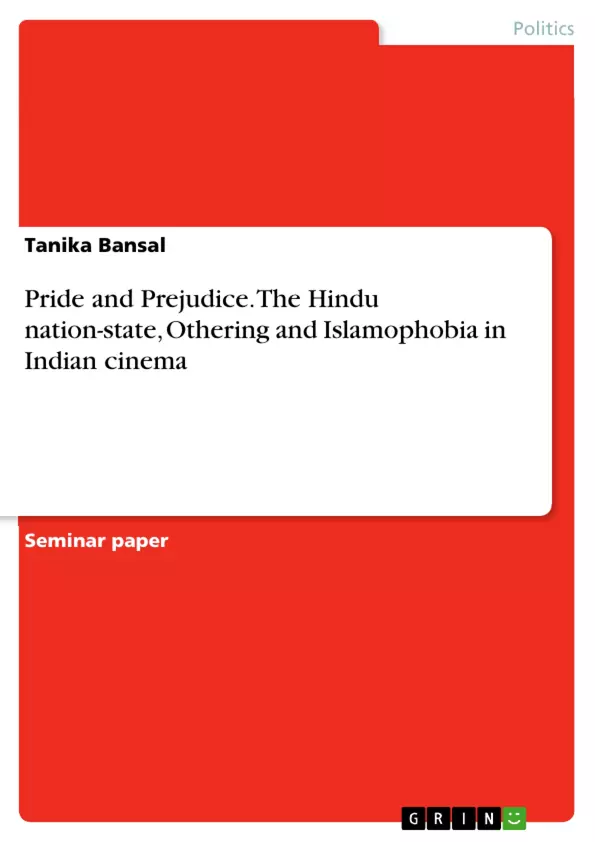This paper seeks to illustrate how popular cinema has dealt with the liminality of the Muslim "Other" in the nation-space by representing Muslims either in a stereotypical manner or by appropriating them into the normative Hindu self especially post 1990s, displaying sentiments of "nationalistic supremacy". The key word here being "nationalistic or nationalism" – a political ideology characterised by the promotion of the interest of a nation-state, especially with the aim of gaining and maintaining sovereignty over "home-land"; and rejecting or ‘othering’ ideologies. The rejection of the ‘othering’ ideology refers to Islamophobia, which becomes another recurring theme in this essay.
Cinema, similar to its contemporary mediums, has acted as a capacious cultural space for politicians, reactionary ideologues, and the defenders of a particular social belief system to reconstruct and reinterpret the archaeologies of the imaginary world built on celluloid, in a manner that suits their own agenda. In the process of such reconstruction, cinema is used to establish linkages between the publicly contested socio-political and historical meanings prevalent in a nation and the filmic world created by cinematography.
Inhaltsverzeichnis (Table of Contents)
- Introduction and Argument
- The Conceptual Framework
- A genealogical sketch of the emergence of the 'Other'
- Orientalism: A Brief Introduction
- Orientalism and India: the Hindu-Muslim Divide
- The Muslim 'Other' & Media Framing
- Historical Framework
- Case in Point: Muslim ‘Otherization' in Bollywood..
- Film Review: Exoticized, Marginalised and Demonized Muslims
- Final Thoughts.......
Zielsetzung und Themenschwerpunkte (Objectives and Key Themes)
This paper examines the portrayal of Muslims in Indian cinema, focusing on how the majoritarian cultural assertiveness of a 'Hindu' nation influences the representation of the Muslim minority. The paper argues that Indian cinema has been complicit in perpetuating Islamophobic stereotypes, 'othering' Muslims through specific narratives and characterizations.
- The role of media in shaping national identity and ideologies
- The impact of Orientalist discourse on the representation of Muslims in India
- The influence of nationalism and Islamophobia on cinematic narratives
- Stereotypical portrayals of Muslims in Indian cinema
- The relationship between cinematic representation and social reality
Zusammenfassung der Kapitel (Chapter Summaries)
The introduction lays out the argument that the increasing Islamophobia in India has impacted the portrayal of Muslims in mainstream cinema, specifically Bollywood. It examines how the communication paradox of information abundance with inauthenticity and criticism has influenced the media landscape, particularly electronic media's role in constructing national identity.
The 'Conceptual Framework' chapter delves into the origins of 'othering', tracing it back to Hollywood's portrayal of Russians during the Cold War. It then introduces Edward Said's Orientalism theory, explaining how the Western construction of the Orient as 'other' has impacted the representation of Muslims in post-colonial India.
Schlüsselwörter (Keywords)
The key focus areas of this paper include Indian cinema, Bollywood, Islamophobia, Orientalism, 'othering', Muslim representation, national identity, and media framing. The research examines how these concepts intersect to influence the portrayal of Muslims in a nation-state with a dominant Hindu identity.
Frequently Asked Questions
How are Muslims portrayed in Indian cinema post-1990s?
Muslims are often represented either through stereotypes or by being appropriated into a normative Hindu national identity, reflecting sentiments of nationalistic supremacy.
What is "Othering" in the context of Bollywood?
It refers to the cinematic process of marginalizing or demonizing the Muslim minority to strengthen a dominant Hindu national self-image.
How does Edward Said's Orientalism apply to Indian films?
The research uses Orientalism to explain how Western constructions of the 'Other' have been adapted in India to frame the Hindu-Muslim divide.
What role does media framing play in national identity?
Media, including cinema, acts as a cultural space where ideologues reinterpret history and social beliefs to suit specific political agendas.
Is Islamophobia a recurring theme in Indian cinema?
Yes, the paper argues that cinema has been complicit in perpetuating Islamophobic stereotypes through specific narratives and characterizations.
- Arbeit zitieren
- Tanika Bansal (Autor:in), 2018, Pride and Prejudice. The Hindu nation-state, Othering and Islamophobia in Indian cinema, München, GRIN Verlag, https://www.hausarbeiten.de/document/497638


